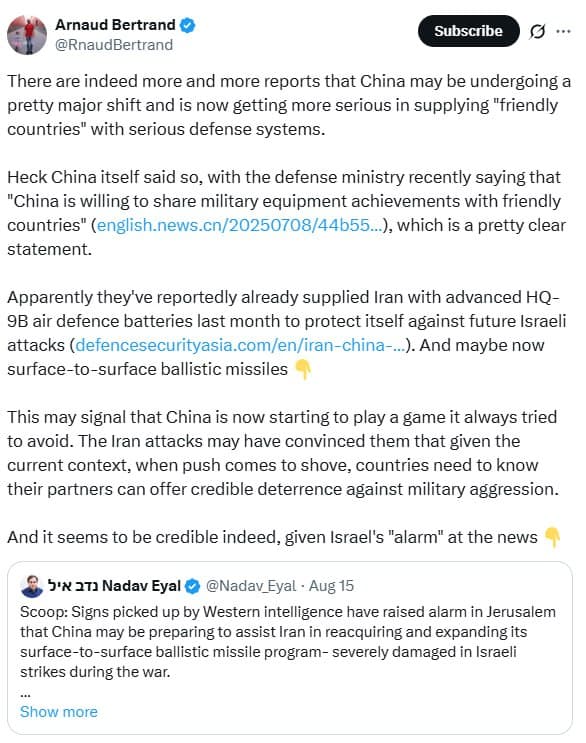Israel on High Alert as China Moves to Arm Iran with Advanced Missile Systems
In a significant development that is raising alarms in Jerusalem, Western intelligence agencies have detected signs suggesting that China is preparing to enhance Iran"s surface-to-surface ballistic missile capabilities. This potential military cooperation marks a notable shift in China"s defense strategy and has prompted Israel to reassess its security posture in the region.
Background & Context
The geopolitical landscape in the Middle East has been fraught with tension, particularly between Israel and Iran. Over the years, Iran has pursued a robust missile program seen as a direct threat by Israel, which has historically taken preemptive measures to neutralize such threats. Recently, reports have emerged indicating that China may be stepping into this volatile arena by providing Iran with advanced military technologies. This move aligns with China"s broader ambition to strengthen ties with "friendly countries" and enhance their defense capabilities.
China"s defense ministry has explicitly stated its willingness to share military achievements with allied nations, a declaration that underscores Beijing"s intent to expand its influence in global defense markets. This strategic pivot could have far-reaching implications for regional stability, especially considering the ongoing hostilities between Iran and Israel.
Key Developments
Recent intelligence reports indicate that China has already supplied Iran with advanced HQ-9B air defense batteries, a move aimed at bolstering Tehran"s defenses against potential Israeli airstrikes. Such systems are designed to provide robust aerial defense, allowing Iran to better protect its critical infrastructure and military assets. Sources suggest that discussions may now be underway regarding the provision of surface-to-surface ballistic missiles, a capability that would significantly enhance Iran"s offensive military posture.
Israel"s response to these developments has been one of heightened concern. Israeli officials have expressed alarm over the prospect of a more militarized Iran, particularly in light of the recent attacks attributed to Iranian proxies across the region. The potential for China to deepen its military cooperation with Iran could alter the balance of power and complicate Israel"s defense strategies.
Broader Impact
This emerging partnership between China and Iran could signify a major shift in the dynamics of Middle Eastern geopolitics. Experts suggest that China’s willingness to supply advanced military systems could embolden Iran, allowing it to pursue a more aggressive stance in its regional ambitions. The implications extend beyond Israel; neighboring countries may feel compelled to reassess their own military capabilities and alliances in response to a stronger Iran.
Historically, China has been wary of directly engaging in military partnerships in the Middle East, often opting for economic ties over military alliances. However, the changing security landscape appears to be pushing China towards a more assertive military role. As noted by geopolitical analyst Arnaud Bertrand, the recent uptick in military support for Iran reflects a strategic calculation by Beijing to ensure that its partners can effectively deter military aggression.
What"s Next
As the situation evolves, several key questions remain. Will Israel ramp up its military operations to counter the growing Iranian threat? How will the United States and its allies respond to China"s increasing military presence in the region? Furthermore, the potential for further military cooperation between China and Iran could provoke a broader arms race in the Middle East, as countries like Saudi Arabia and the UAE may seek to enhance their own defense capabilities.
With tensions running high, the international community will be closely monitoring developments in this precarious situation. As previously reported, the dynamics of global alliances are shifting, and the ramifications of China"s support for Iran could reverberate throughout the region for years to come. The stakes are high, and the path forward remains uncertain as nations navigate this complex web of military and diplomatic challenges.


![[Video] Heavy clashes and gunfire reported in Baghdad, Iraq](/_next/image?url=%2Fapi%2Fimage%2Fthumbnails%2Fthumbnail-1768342239932-848qsh-thumbnail.jpg&w=3840&q=75)




![[Video] Gunfire between Iraqi security forces and Sadr militias in Baghdad](/_next/image?url=%2Fapi%2Fimage%2Fthumbnails%2Fthumbnail-1768343508874-4redb-thumbnail.jpg&w=3840&q=75)
